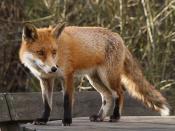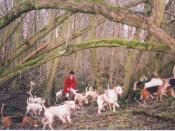A farmer is awakened in the dead of night by a commotion in his chicken coop. The scene that awits him is horific; half of his hens are dead and the other half are injured beyond recovery. If he calls out the hunt to track and kill the fox responsible would he be participating in a cruel sport or a countryside necessity? I believe foxhunting should not be banned as it has been practised since man began farming animals and has been popular for over 200 years. It performs a useful function in rural areas both in the control of foxes and as a social gathering.
The fox is a pest and its numbers need to be controlled. In 1991 the labour party produced a document that stated " There is no doubt... that foxes can be damaging and indescriminate predators of birds and other animals....Control methods must remain available" .
To elaborate the key word is control. The pro hunt camaigners do not want to exterminate all foxes; they simply want to maintain there population at a level that is not a threat to livestock. Foxhunting with hounds is the most natural method of management. The foxes that are killed are usually the old or the sick with the younger healthier foxes escaping and going to ground. When a fox is caught it is killed within seconds; it is never left injured and suffering. Hence it can be demonstrated to be a humane method of management. In addition when a farmer calls in the hunt to catch a fox that has been harming his livestock surely that is responsible work not sport.
Many people in the countryside depend on foxhunting for employment, therefor the economic survival of rural populations would be threatened by a ban. The hounds would also suffer; as they are dogs who are used to hunting in packs they would not be suitable as pets.
Anti hunt campaigners argue that the case for fox control is exagerated but research suggests that between 1%-2% of lambs are killed by foxes each season.
As well as the suffering to the animals this also costs the farmer between ã55-ã1000 each season. This figure is taken when the fox population is being controlled, without control this figure would be higher.
It is also argued that without taking any action there would be natural population control. As the fox is top of its food chain it has no natural predators therefor its nu,bers would inevitably rise.
In conclusion, the fox may be a beatiful animal to look at but it must be remembered that it is basically an oportunistic predator. As a wid animal it should command respect not sentimentality.





